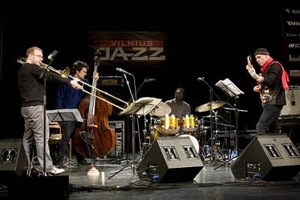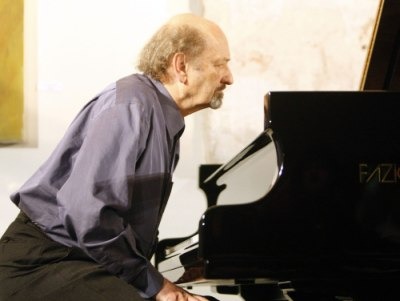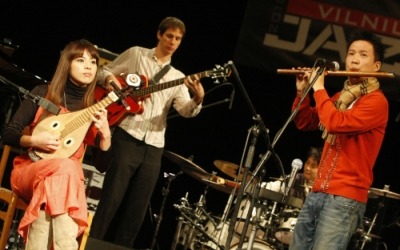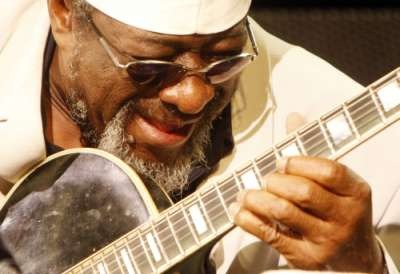VILNIUS JAZZ: SHOTS AT GOAL AND OFF THE TARGET 0
Asta Andrė
www.kamane.lt , 2010 10 26
Samuel Blaser Quartet: fire of music struck by M.Ducret (first from the right). Photo of Ramūnas Danisevičius
J.G. Brönnimann from Brink Man Ship played with outstanding passion. Photo of R. Danisevičius
G. Szabados called the father of Hungarian free jazz organised one of the most impressive concerts in the festival. Photo by R. Danisevičius
Sizhukong combined traditions of the East and the West with taste and professionalism. Photo by R. Danisevičius
J.Ulmer touched hearts by his sonorous voice and blues-like passages only sometimes. Photo by R. Danisevičius
In brief: The 23rd contemporary jazz festival Vilnius Jazz will be remembered as the biggest in its entire history and one of the most interesting and colourful, even though not all projects corresponded to the declared direction of the festival; i.e., to show the newest phenomena of jazz and things that take avant-garde art ahead.
Sixteen projects in six days: such was Vilnius Jazz this year. According to the festival producer Antanas Gustys, the festival was organised without any commercial supporters and almost without any advertisement.
“Like no other festival in Lithuania, this festival grants strength of the spirit to people as it presents personalities who serve their vocation, big idea rather than the pocket,” A.Gustys is sure.
One of such dedicated personalities was the pianist called the father of Hungarian free jazz György Szabados in Vilnius Jazz of this year. He organised one of the most impressive concerts in the festival. The pianist who started the eighth decade of his life astounded by his incredible expression, coherent thought and concentration.
Meanwhile, the most awaited show of the US free jazz legend James Blood Ulmer became the biggest frustration of Vilnius Jazz. The guitarist younger than G.Szabados by several years, the former partner of the stage masters Ornette Coleman, Rashied Ali, Arthur Blythe, Julius Hemphill, made a bigger impression by the luxurious stage equipment rather than music.
The band of Taiwan Sizhukong could have won the election of the most charismatic participant of Vilnius Jazz. Not many could have believed that traditional Chinese flutes, lutes and violins, motifs of folk music could match jazz stylistics and improvisations so naturally. Sizhukong combined traditions of the East and the West with taste and professionalism.
The experimental aura of Vilnius Jazz should have been strengthened by the alternative rock band DarkBlueWorld from Canada; still, it did not justify this expectation. The Canadian jazz guitarist Tony Wilson and other musicians remained in the shadow of the extravagant leader, singer and poetess Elizabeth Fischer.
Perhaps it was the international Samuel Blaser Quartet and Swiss Brink Man Ship that corresponded to the stylistics of Vilnius Jazz, when speaking about foreign performers. The wonderful bass clarinettist J.G. Brönnimann and Brink Man Ship played with outstanding passion in Vilnius and established a close relation with the audience.
In addition to selected foreign musicians, Lithuanian artists participated in Vilnius Jazz festival as equal performers. The monumental project of the trio of the saxophonist Janas Maksimovičius, accordionist Raimondas Sviackevičius and percussionist Arkadijaus Gotesmanas ACCOsax Freeminded left the biggest impression.
On the other hand, the project of the wind instrument master Liudas Mockūnas’ trio NuClear (L.Mockūnas, keyboardist Dmitrijus Golovanovas and drummer Marijus Aleksa) presented along with the Danish sound artist Jacob Riis cannot be evaluated only positively. The mood of the effective start did not gain clearer contours.
Meanwhile, the tandem of L.Mockūnas and M.Aleksa NuClear did not cause any doubts: the categorical tone of the leader was refreshed by the subtle music of M.Aleksa. Speaking about the programme of the keyboardist, composer and arranger Dainius Pulauskas, it should be noticed that the stage partners of the leader did not have enough time to understand the new complicated compositions prepared by the composer for the festival.
Young bands, finalists of the 5th Vilnius Jazz Young Power looked well in the background of Lithuanian jazz masters. It is only surprising that the number of people willing to study jazz is increasing, and the number of participants of Vilnius Jazz Young Power is decreasing every year.
Luckily, the level of the competition did not suffer from this: all four ensembles that participated in it (Bon Ton, Dauleou, Yo-Yo Mo-Mo-Mo, Vilkšu pa muguru) performed compositions worth the stage of Vilnius Jazz.
The majority of musicians who prepared their first projects for this competition continue their jazz careers. The belief of A.Gustys that Vilnius Jazz is working for music and jazz creators first of all rather than for supporters or the so-called high society is not only loud words.





